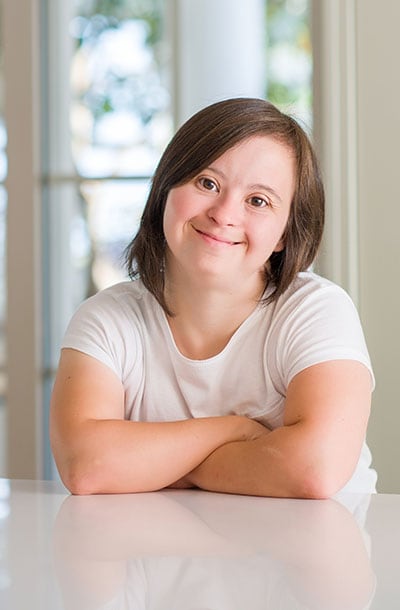
 Assessing speech-language abilities of children with genetic disorders and developmental disabilities is no easy feat. Although developmental and genetic disorders affecting cognition, communication and functioning are increasingly widespread, speech-language assessment procedures for select populations (e.g., Down Syndrome) remain poorly understood by many speech-language professionals, resulting in ineffective or inappropriate service provision.
Assessing speech-language abilities of children with genetic disorders and developmental disabilities is no easy feat. Although developmental and genetic disorders affecting cognition, communication and functioning are increasingly widespread, speech-language assessment procedures for select populations (e.g., Down Syndrome) remain poorly understood by many speech-language professionals, resulting in ineffective or inappropriate service provision.
According to the Centers for Disease Control and Prevention, Down Syndrome occurs in 1 of every 691 live births making it one of the most prevalent genetic disorders affecting health, cognition, development, and communication. That is why I created a comprehensive 90 page presentation entitled: “Comprehensive Assessment of Monolingual and Bilingual Children with Down Syndrome” which discusses how to assess young (birth-early elementary age) verbal and nonverbal monolingual and bilingual children with Down Syndrome (DS). It describes specific speech and language deficits associated with Down Syndrome as well as explains how to individualize and utilize functional assessment batteries to test these children’s communication abilities. It also offers comprehensive examples of write-ups based on real-life clients of all the assessment sections (e.g., receptive, expressive, articulation, oral-peripheral mechanism, etc) as well as lists examples of goals and objectives by category.
- Parents
- Caregivers
- Medical and Educational Speech Language Pathologists including
- Graduate Students
- Clinical Fellows
- Change of Career Professionals
- Related Professionals
- Psychologists
- Social Workers
- Occupational Therapists
- Special Education Teachers
Contents:
- Introduction
- General Milestones
- Feeding
- Oral Sensitivity Issues
- Swallowing
- Craniofacial Anatomy
- Effect of Craniofacial Anatomy on Speech
- Speech
- Voice
- Fluency and Prosody
- Language Deficits Overview
- IQ and Children with DS
- Strengths and Weaknesses in DS
- Assessments for Nonverbal and Limitedly Verbal Children with DS
- Developmental Scale for Children with DS
- Early Functional Profile Set
- Functional Communication Profile
- Augmentative & Alternative Communication Profile
- Communication and Symbolic Behavior Scales Developmental Profile
- Communication Matrix
- Bilingualism and Down Syndrome
- Bilingual Assessment of Children with DS
- Assessment of Bilingual Verbal Children with DS (comprehensive components)
- Background History Sample Write-Up
- Sample Parent Questionnaire
- Language Background and Use Sample Write-Up
- Use of Disclaimers for Standardized Testing on Children w/t DS
- Assessment: Auditory and Visual Domains
- Assessment of Feeding and Swallowing
- Feeding and Swallowing Sample Write-Up
- Assessment of Oral-Motor Mechanism
- Example of an Oral Motor Write Up
- Assessment : Articulation
- Sample Articulation Sample Write-Up
- Assessment: Voice and Resonance + Sample Write-Up
- Assessment of Adaptive Behavior and Learning Style
- Adaptive Behavior Sample Write-Up
- Learning Style Sample Write-Up
- Attention to Task Sample Write-Up
- Pragmatic Language Assessment
- Pragmatic language strengths in children with DS
- Assessment of Receptive Language
- Receptive Language Sample Write-Up
- Informal Receptive Language Sample Write-Up
- Dynamic Assessment Sample Write-Up
- Assessment of Expressive Language
- Expressive Language Sample Write-Up
- Informal Expressive Language Sample Write-Up
- Vocabulary Assessment
- Receptive Vocabulary Sample Write-Up
- Vocabulary Inventories
- Expressive Vocabulary Sample Write-Up
- Impressions: Sample Write-Up
- Recommendations: Sample Write-Up
- Swallowing Recommendations Sample Write-Up
- Writing Therapy Goals
- Writing Measurable Goals
- Prompts vs. Cues
- Types of Cues
- Tips on Levels of Cueing
- Play Skills: Sample Write-Up
- Articulation: Sample Write-Up
- Receptive Language: Sample Write-Up
- Expressive Language: Sample Write-Up
- Pragmatic Language: Sample Write-Up
- Conclusion
- Online Resources
- Helpful SST Resources
- References
You can find this product in my online store HERE.
Hi Tatyana,
I am working on my CFY and just started in an outpatient pediatrics clinic. I will be assessing a 11 yo girl diagnosed with DS, who is non-verbal and presents with a lots of behavior and can’t attend….Do you think this is a good package for me to buy? Everything is coming out of my own pocket, that is what I am being careful on what I buy, cuz I know it can add up…
Thank you!
Teresa Landa
Teresa
I believe that you’ll find this product very helpful. It offers a number of test suggestions and procedures for assessing nonverbal children with DS. I also wanted to point out that if this child presents with significant behavioral challenges the following material may be very helpful to you as well http://www.smartspeechtherapy.com/shop/behavior-management-strategies-for-speech-language-pathologists/
Please don’t hesitate to contact me if you have any further questions